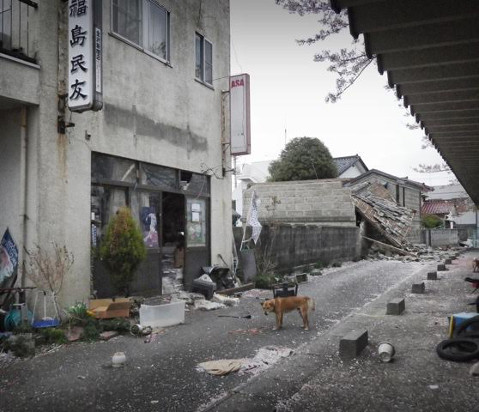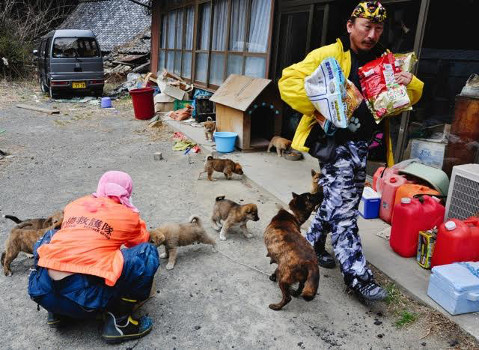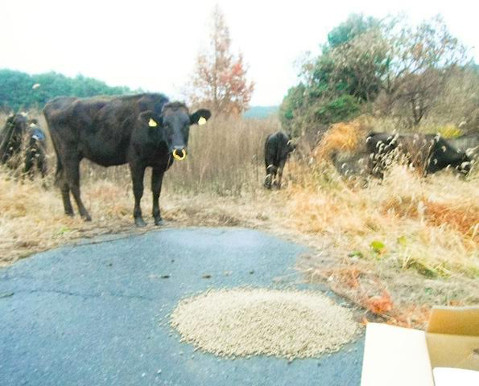Survival and Rescue Work Continues at Fukushima
Counting the Human and Animal Toll Six Years After Nuclear Meltdown

“The Fukushima accident has shown that people cannot coexist with nuclear power. I believe the only way to preserve human life is to completely turn away from nuclear power.” —Kenzaburo Oe, Nobel Prize-winning novelist
On March 11, 2011, 2:46 p.m., it felt like the world was ending Frightened people screamed in terror. Shattered glass flew everywhere. The memories of that day are tattooed on my brain and will never be erased.
Many cities that were damaged in the Great East Japan Earthquake and Tsunami disaster are on their way to slow recovery. One disaster area, however, may never have its place on the map again. The triple meltdown at the Fukushima Daiichi Nuclear Power Plant forced the evacuation of 170,000 people. Six years later, 84,000 residents still cannot safely return to their homes in Fukushima due to the high levels of radiation. They are the forgotten ones, their stories swept under Japan’s 2020 Tokyo Olympics carpet.
I live in a small home in Tokyo with my family. We lead typical lives, but 3.11 changed everything. So many lives were lost. So much devastation occurred. I couldn’t stand by and witness this destruction without helping. I had to do something.
My first trip to the disaster area was in August 2011 to Kamaishi, a city 370 miles north of Tokyo. My volunteer work included photograph restoration, grief counseling in the temporary housing, debris removal, and cook-outs.
Now I travel every weekend to one of the disaster areas in Fukushima. I have visited thousands of people in cramped two-room temporary housing, living with three to four family members. I listen to them, try to ease their pain, or just hold their hands. Many have lost hope and have taken their own lives.

The rural Fukushima area was evacuated on March 12, 2011. When residents were woken up in the middle of the night and told to board buses, destination unknown, they were told not to bring personal belongings, including their pets. Thinking they would return soon, pet owners left two or three days’ worth of food and water. Some owerns tied their animals up; some let them run loose. The residents never returned. The animals that were tied up perished.
I soon became involved in animal rescue missions in the exclusion zones near the crippled nuclear power plant. Under the supervision of Animal Rescue Nyander Guard in Fukushima (nyan = “meow” in Japanese), staff and volunteers enter the contaminated restricted areas three to four times a month and rescue as many animals as they can. Photos of the rescued animals are uploaded to Internet sites, which has initiated many successful reunions.
Dogs and cats are easier to rescue. Farm animals, however, have no escape. One woman who ran a dairy farm cried profusely. “You can’t just carry a cow out like a dog. I had fifty dairy cows. They were my babies! I was forced to abandon them!”

Today, Animal Rescue Nyander Guard searches for animals left to wander inside the exclusion zones. The group has saved more than 760 animals since the nuclear disaster in April 2011. Six years of unrelenting devotion has helped reunite pets with their owners, find new families for abandoned animals, and shelter those homeless ones awaiting adoption.
This Saturday marks the sixth anniversary of the ongoing Fukushima nuclear meltdown. To commemorate this day, the community of Santa Barbara is invited to attend a free public exhibit and presentation at the Karpeles Manuscript Library Museum Auditorium, 1-4 p.m., Saturday, 3.11.17, to learn first hand about those affected by this disaster.
Today we are still realizing the widespread impacts the Fukushima nuclear meltdown caused for the Japanese people and their ongoing affect around the Earth. TEPCO (Tokyo Electric Power Company, the owner of the Fukushima Daiichi plants) still has not located the molten fuel, and the plant continues to release significant amounts of radioactive material into the ocean. And while workers continue to clean up the site, they are unable to contain the extensive radioactivity at the destroyed reactors. Disasters like Chernobyl and Fukushima remind the world how dangerous nuclear power is.
In an effort to downplay the risks of radiation and prepare for the 2020 Tokyo Olympics, the Japanese government is set to lift evacuation orders as early as this month by forcing people back into heavily contaminated areas. Unfortunately, a majority of the returning evacuees may not be well informed about the dangers they face. With a penalty of up to 10 years, the Secrecy Law in Japan has scared the media into silence regarding so-called “state secrets.”
Please stand in solidarity with the Fukushima survivors and sign this Greenpeace petition to Japan’s Prime Minister Shinzō Abe, demanding fair treatment and transparency.




